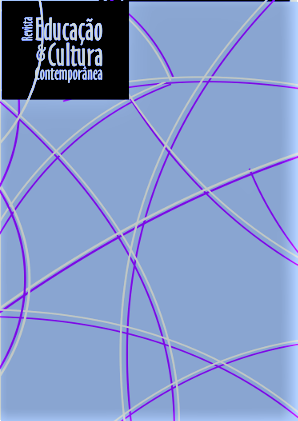Formação de professores indígenas guarani e kaiowá em Mato Grosso do Sul: o empoderamento que circula entre dois mundos
Abstract
Resumo Estudos antropológicos apontam que as forças de poder guarani e kaiowá concentram-se em dois pilares - a força extraterrena e a força terrena. Estas forças se entrelaçam no dia a dia das pessoas, em maior ou menor intensidade. O texto busca problematizar o seguinte questionamento: "a formação dos professores guarani e kaiowá reflete as relações de poder, inseridas nas figurações históricas desse grupo"? Para tal, objetivamos compreender as redes de interdependência que figuram nos cursos de formação de professores indígenas da etnia guarani e kaiowá, na Secretaria de Educação de Mato Grosso do Sul e na Universidade Federal da Grande Dourados. Essa formação, nos níveis médio e superior, foi uma conquista dos povos indígenas, inseridos num processo histórico mais amplo e complexo. A pesquisa é de caráter bibliográfico enriquecida com depoimentos de uma indigenista que atua na formação de professores guarani e kaiowá há mais de 30 anos e participa da escrita deste texto. A relevância do estudo consiste em registrar o processo de efetivação de uma formação específica dos povos indígenas, em um país que demorou 488 anos para inserir a população indígena na sua Carta Magna. Um país que dispõe de 240 línguas faladas em seu território nacional, embora enfatize somente a língua do colonizador nos estudos escolares da Educação Básica. Nas considerações finais pontuamos a formação da rede de interdependência que fortalece o empoderamento dos indígenas da etnia guarani e kaiowá de Mato Grosso do Sul, no quesito formação de professores. Palavras-chave: Formação de professores indígenas. Guarani e kaiowa. Figurações e poder. Abstract Anthropological studies indicate that Guarani and Kaiowá power forces are concentrated on two pillars - extraterrestrial force and earthly force. These forces intertwine in people's daily lives, to a greater or lesser extent. The text seeks to problematize the following questioning: "Does the formation of Guarani and Kaiowá teachers reflect the power relations inserted in the historical figurations of this group"? To do this, we aim to understand the networks of interdependence that appear in the training courses of indigenous teachers of the Guaraní and Kaiowá ethnic groups, at the Department of Education of Dourados, Mato Grosso do Sul and at the Indigenous Intercultural Faculty of the Federal University of Grande Dourados. This training, at the middle and higher levels, was an achievement of indigenous peoples, inserted in a broader and more complex historical process. The method is bibliographical, with the testimony of an indigianist who has worked with the Guarani and Kaiowá for more than 30 years and participates in the writing of this text. The relevance of the study is to record the process of carrying out specific training of indigenous peoples in a country that took 488 years to insert the indigenous population into its Constitution. Brazil is a country that has 240 languages spoken in its national territory, although it emphasizes only the language of the colonizer in the school studies of Basic Education. In the final considerations we point out the formation of the network of interdependence that strengthens the empowerment of the Guaraní and Kaiowá natives of Mato Grosso do Sul in the training of teachers. Keywords: Training of indigenous teachers. Guarani and Kaiowa. Figuration and power.Downloads
Published
Issue
Section
License
Ao submeter um artigo para publicação na Revista Educação e Cultura Contemporânea, o (s) autor(es) concordam com os seguintes termos:
I. O(s) autor(es) e o(s) eventual(is) coautor(es) conhecem e declaram concordar com as políticas editoriais da revista para a publicação de artigos e com os termos e diretrizes a seguir;
II. Os autores garantem que o trabalho não foi publicado anteriormente em meio eletrônico ou impresso, tampouco encaminhado para publicação em língua portuguesa em outros periódicos. Também asseguram que todos os autores participaram na elaboração intelectual de seu conteúdo;
III. Os artigos publicados representam, exclusivamente, a expressão do ponto de vista de seus autores e não a posição da Revista Educação e Cultura Contemporânea ou do Programa de Pós-Graduação em Educação da Universidade Estácio de Sá;
IV. É responsabilidade do(s) autor(es) assegurar que o manuscrito não contenha elementos que revelem sua identidade, garantindo a revisão cega durante o processo de avaliação por pares. Para isso, devem ser adotadas as seguintes medidas: remover nomes de autores, afiliações institucionais e quaisquer informações pessoais do corpo do texto e das notas de rodapé; substituir referências à própria produção por termos neutros, como “Autor(a)” ou “Autor(a), ano”, evitando citações que permitam a identificação; nomear o arquivo de submissão de forma neutra, sem mencionar o nome do(s) autor(es); e excluir metadados do documento que possam identificar a autoria (ex.: propriedades do arquivo em editores de texto).
V. O responsável pela submissão deve certificar-se do preenchimento completo e correto das informações de todos os colaboradores, conforme solicitado no sistema de submissão, incluindo: nome completo, filiação institucional atualizada, e-mail, link para o currículo Lattes (para participantes brasileiros), ORCID e minicurrículo;
VI. O(s) autor(es) comprometem-se a submeter o manuscrito utilizando exclusivamente o template oficial disponibilizado pela Revista Educação e Cultura Contemporânea (REEDUC), assegurando o cumprimento integral das normas de formatação exigidas. Isso inclui a padronização de margens, fonte, espaçamento, estilo de citações e referências bibliográficas, conforme descrito nas Diretrizes para Autores. Submissões fora do padrão estabelecido poderão ser rejeitadas ou devolvidas para ajustes antes do encaminhamento à avaliação por pares.
VII. Caso tenha sido utilizado algum recurso de inteligência artificial (IA) durante a elaboração do manuscrito, o(s) autor(es) deve(m) declarar esse uso, seguindo as orientações do template e da seção "Declaração de Direito Autoral", disponíveis nesta página.





